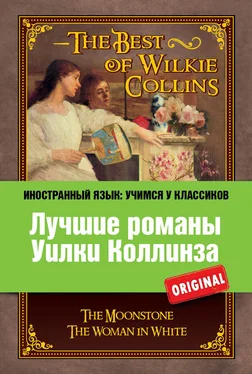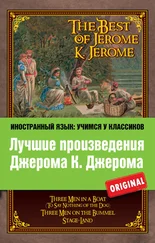In another hour’s time I had done my work, and the sunset was at hand. I got my hat and coat in the hall, and slipped out of the house without meeting any one.
The clouds were wild in the western heaven, and the wind blew chill from the sea. Far as the shore was, the sound of the surf swept over the intervening moorland, and beat drearily in my ears when I entered the churchyard. Not a living creature was in sight. The place looked lonelier than ever as I chose my position, and waited and watched, with my eyes on the white cross that rose over Mrs. Fairlie’s grave.
The exposed situation of the churchyard had obliged me to be cautious in choosing the position that I was to occupy.
The main entrance to the church was on the side next to the burial-ground, and the door was screened by a porch walled in on either side. After some little hesitation, caused by natural reluctance to conceal myself, indispensable as that concealment was to the object in view, I had resolved on entering the porch. A loophole window was pierced in each of its side walls. Through one of these windows I could see Mrs. Fairlie’s grave. The other looked towards the stone quarry in which the sexton’s cottage was built. Before me, fronting the porch entrance, was a patch of bare burial-ground, a line of low stone wall, and a strip of lonely brown hill, with the sunset clouds sailing heavily over it before the strong, steady wind. No living creature was visible or audible – no bird flew by me, no dog barked from the sexton’s cottage. The pauses in the dull beating of the surf were filled up by the dreary rustling of the dwarf trees near the grave, and the cold faint bubble of the brook over its stony bed. A dreary scene and a dreary hour. My spirits sank fast as I counted out the minutes of the evening in my hiding-place under the church porch.
It was not twilight yet – the light of the setting sun still lingered in the heavens, and little more than the first half-hour of my solitary watch had elapsed – when I heard footsteps and a voice. The footsteps were approaching from the other side of the church, and the voice was a woman’s.
“Don’t you fret, my dear, about the letter,” said the voice. “I gave it to the lad quite safe, and the lad he took it from me without a word. He went his way and I went mine, and not a living soul followed me afterwards – that I’ll warrant.”
These words strung up my attention to a pitch of expectation that was almost painful. There was a pause of silence, but the footsteps still advanced. In another moment two persons, both women, passed within my range of view from the porch window. They were walking straight towards the grave; and therefore they had their backs turned towards me.
One of the women was dressed in a bonnet and shawl. The other wore a long travelling-cloak of a dark-blue colour, with the hood drawn over her head. A few inches of her gown were visible below the cloak. My heart beat fast as I noted the colour – it was white.
After advancing about half-way between the church and the grave they stopped, and the woman in the cloak turned her head towards her companion. But her side face, which a bonnet might now have allowed me to see, was hidden by the heavy, projecting edge of the hood.
“Mind you keep that comfortable warm cloak on,” said the same voice which I had already heard – the voice of the woman in the shawl. “Mrs. Todd is right about your looking too particular, yesterday, all in white. I’ll walk about a little while you’re here, churchyards being not at all in my way, whatever they may be in yours. Finish what you want to do before I come back, and let us be sure and get home again before night.”
With those words she turned about, and retracing her steps, advanced with her face towards me. It was the face of an elderly woman, brown, rugged, and healthy, with nothing dishonest or suspicious in the look of it. Close to the church she stopped to pull her shawl closer round her.
“Queer,” she said to herself, “always queer, with her whims and her ways, ever since I can remember her. Harmless, though – as harmless, poor soul, as a little child.”
She sighed – looked about the burial-ground nervously – shook her head, as if the dreary prospect by no means pleased her, and disappeared round the corner of the church.
I doubted for a moment whether I ought to follow and speak to her or not. My intense anxiety to find myself face to face with her companion helped me to decide in the negative. I could ensure seeing the woman in the shawl by waiting near the churchyard until she came back – although it seemed more than doubtful whether she could give me the information of which I was in search. The person who had delivered the letter was of little consequence. The person who had written it was the one centre of interest, and the one source of information, and that person I now felt convinced was before me in the churchyard.
While these ideas were passing through my mind I saw the woman in the cloak approach close to the grave, and stand looking at it for a little while. She then glanced all round her, and taking a white linen cloth or handkerchief from under her cloak, turned aside towards the brook. The little stream ran into the churchyard under a tiny archway in the bottom of the wall, and ran out again, after a winding course of a few dozen yards, under a similar opening. She dipped the cloth in the water, and returned to the grave. I saw her kiss the white cross, then kneel down before the inscription, and apply her wet cloth to the cleansing of it.
After considering how I could show myself with the least possible chance of frightening her, I resolved to cross the wall before me, to skirt round it outside, and to enter the churchyard again by the stile near the grave, in order that she might see me as I approached. She was so absorbed over her employment that she did not hear me coming until I had stepped over the stile. Then she looked up, started to her feet with a faint cry, and stood facing me in speechless and motionless terror.
“Don’t be frightened,” I said. “Surely you remember me?”
I stopped while I spoke – then advanced a few steps gently – then stopped again – and so approached by little and little till I was close to her. If there had been any doubt still left in my mind, it must have been now set at rest. There, speaking affrightedly for itself – there was the same face confronting me over Mrs. Fairlie’s grave which had first looked into mine on the high-road by night.
“You remember me?” I said. “We met very late, and I helped you to find the way to London. Surely you have not forgotten that?”
Her features relaxed, and she drew a heavy breath of relief. I saw the new life of recognition stirring slowly under the death-like stillness which fear had set on her face.
“Don’t attempt to speak to me just yet,” I went on. “Take time to recover yourself – take time to feel quite certain that I am a friend.”
“You are very kind to me,” she murmured. “As kind now as you were then.”
She stopped, and I kept silence on my side. I was not granting time for composure to her only, I was gaining time also for myself. Under the wan wild evening light, that woman and I were met together again, a grave between us, the dead about us, the lonesome hills closing us round on every side. The time, the place, the circumstances under which we now stood face to face in the evening stillness of that dreary valley – the lifelong interests which might hang suspended on the next chance words that passed between us – the sense that, for aught I knew to the contrary, the whole future of Laura Fairlie’s life might be determined, for good or for evil, by my winning or losing the confidence of the forlorn creature who stood trembling by her mother’s grave – all threatened to shake the steadiness and the self-control on which every inch of the progress I might yet make now depended. I tried hard, as I felt this, to possess myself of all my resources; I did my utmost to turn the few moments for reflection to the best account.
Читать дальше
Конец ознакомительного отрывка
Купить книгу












